In July, 2023 We, the students of the JMC department at Aliah University, decided to perform a ‘Nukkad Natak‘ on the stigma surrounding menstruation as a practical part of community media of our syllabus, after our female friends and classmates shared their experiences—the struggles, discomfort, and burdens imposed on them during their periods.
During the play, we enacted the discomfort and shame that society imposes on menstruating girls and women. But after being placed in Bastar, one of the most remote villages in India, as an India Fellow, I began to witness these struggles unfold in real time—where menstruation is not just a taboo but a period of isolation and hardship.
Participation In Implementation Of Project Baala
Last month, I got an opportunity to be part of the implementation of Project Baala in the tribal areas of Bastar. Project Baala is a social enterprise dedicated to providing sustainable and affordable menstrual hygiene solutions, primarily in rural India, Nepal and some African countries like Ghana, Tanzania and South Africa.
As part of this initiative, an NGO from Punjab—Joti Foundation collaborated with Shiksharth, the organization I work with, to conduct workshops on menstruation and distribute sanitary pads in tribal villages of Sukma.
Photo: Intervention in Chikpal village
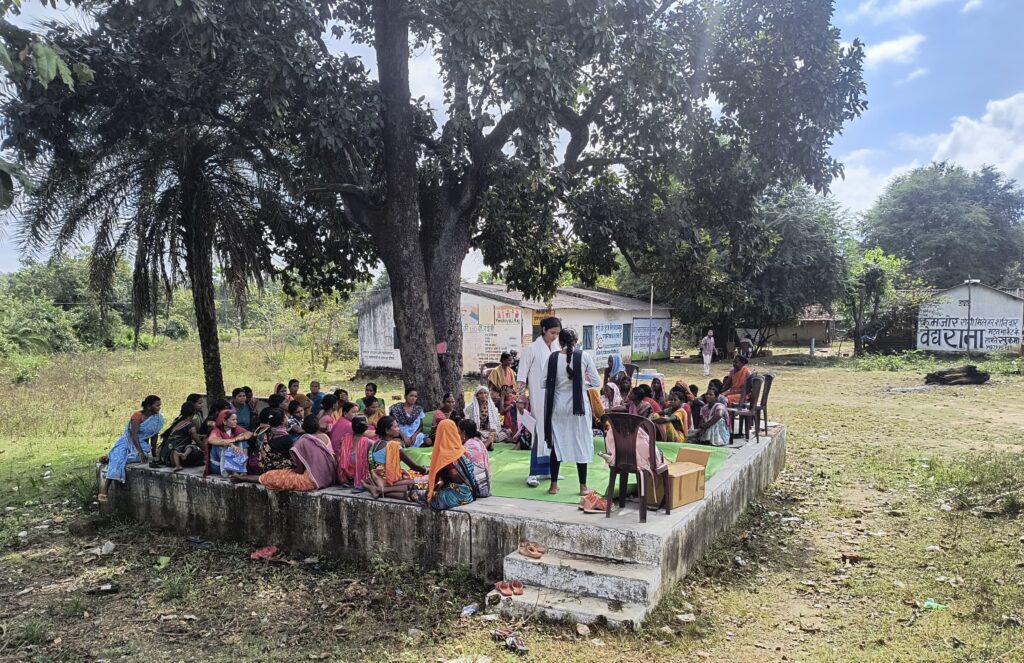
For ten days, my colleagues and I accompanied the Joti Foundation team, guiding them through these remote villages. During this time, I came to understand the realities of menstruation in these communities—what tribal girls and women go through each month, the restrictions imposed on them, and the deeply ingrained beliefs that shape society’s perception of menstruation.
Is It Really Needed
During the planning for the program, one of my colleagues said,
“Do they really need these? Most tribal women don’t wear undergarments, so won’t these pads be useless to them?”
Was this statement actually true? Were sanitary pads really impractical for most women? The questions made me reflect on whether well-intended interventions like these truly align with the needs and realities of the community. I asked how they knew that? They replied from the Menstrual Hygiene Management (MHM) team of our organization.
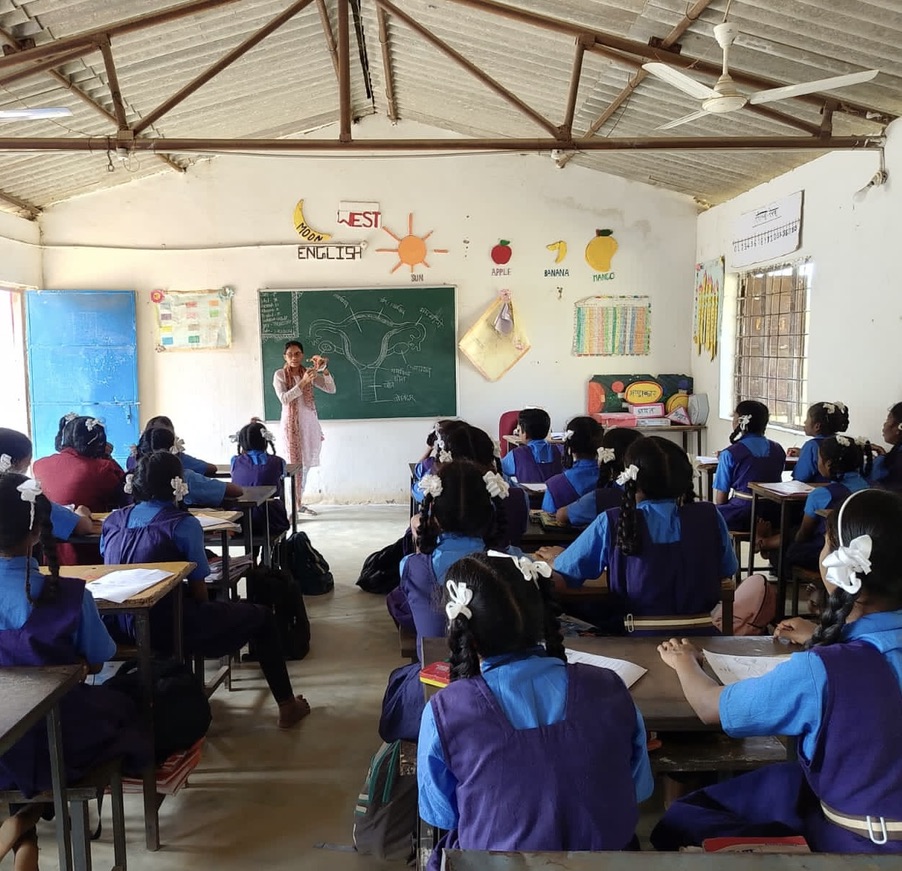
Curious to know more, I asked some members of the MHM team—local girls working in our organization. My colleague Dipali said, “it is true that many older women, especially those who have reached menopause, do not wear undergarments, most young women do. Even some young women who don’t usually wear undergarment often start wearing them during their periods so they can use sanitary pads. Some even begin wearing undergarments regularly after being introduced to pads.”
Photo: Depali, my colleague, is taking session on menstrual health and hygiene in a residential school.
Undoubtedly pad is helpful for many tribal women. However, the most valuable and impactful thing is the workshop through which the come to know what menstruation actually is, why they bleed every month.
Raginee another colleague says, “most girls who experience their first period have no prior knowledge of menstruation. Some believe it is a disease, while others panic and even drop out of school. On top of this, numerous strict rules are imposed on them during menstruation. That’s why educating tribal girls about menstruation is one of the most crucial aspects of menstrual health management.”
Photo: Raginee is taking session
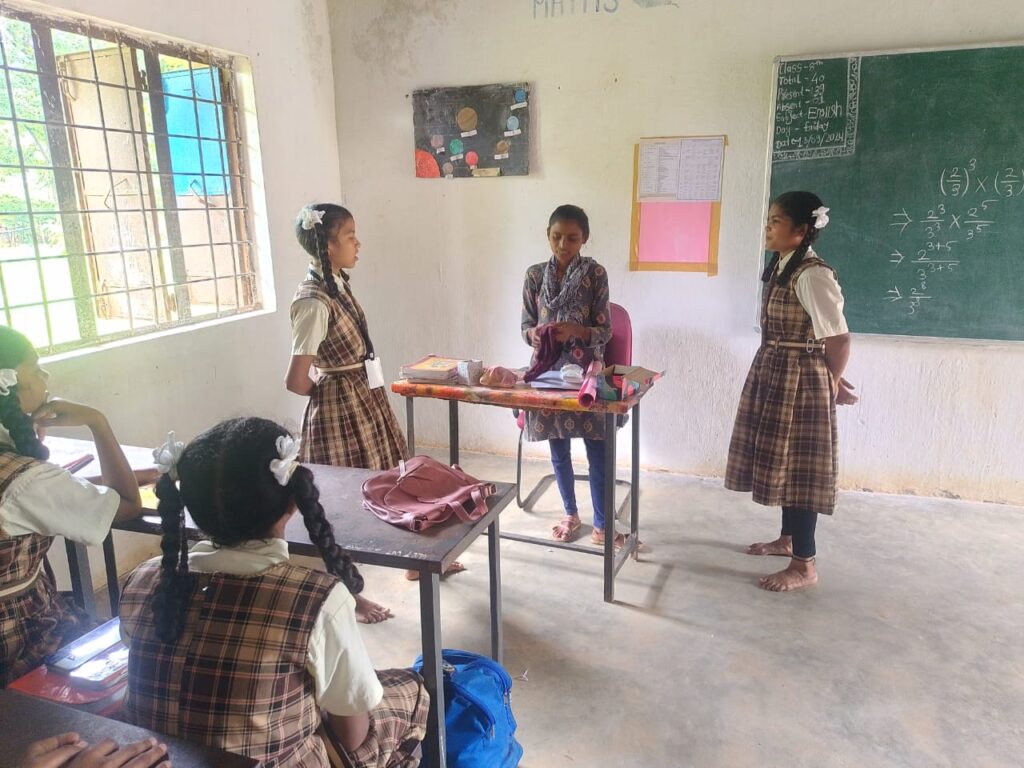
The Men’s Perspective
To understand the male perspective, I asked two community youth members, Vijay and Hidma. Vijay said that if girls are provided with pads, especially, they will experience a more hygienic period and be safer. They wouldn’t have to worry as much about maintaining hygiene, as many rely on old cloth during menstruation. Hidma agreed with Vijay, emphasizing that both sanitary pads and basic menstrual education are necessary.
Since many girls don’t know what to do during their periods, providing both knowledge and resources can help them manage menstruation better.
With the Jyoti Foundation team, we planned to cover 15 villages in 8 days. To make the most of our time, we divided into two groups, each visiting different villages daily. During the workshops, the male members of both Joti Foundation and Shiksharth stepped aside, allowing the female facilitators from Joti Foundation to lead the sessions. This ensured that the women and girls felt comfortable discussing menstruation openly.
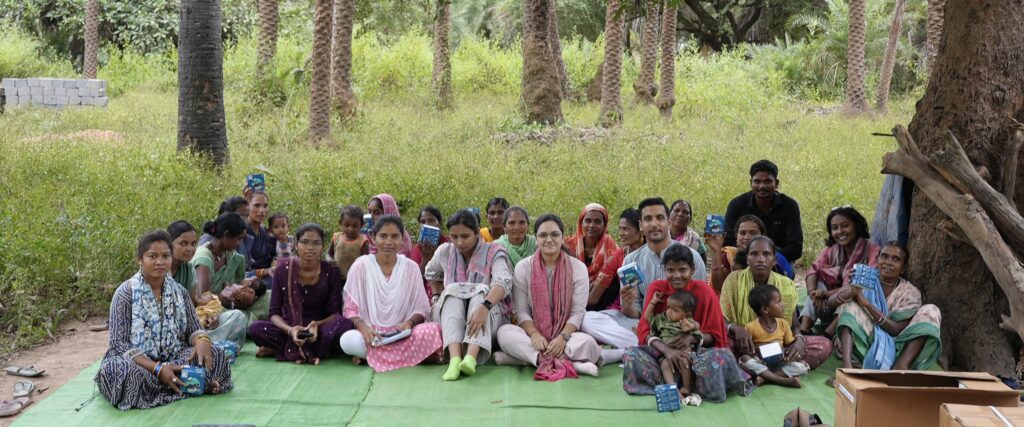
Photo: In Jhapra village
During this time, the Joti Foundation team also sought to understand men’s perceptions and the broader societal mindset regarding menstruation. Ajit Brar, the founder of Joti Foundation, conducted multiple interviews with villagers, young boys, and even priests in the areas where the workshops were held. One thing remained constant across all conversations—everyone believed menstruation to be a period of impurity. Most of them support the strict rules imposed on menstruating women.
An Interview
During one of the interviews, Ajit Brar approached a shopkeeper, around 35 years old, and asked, “आपको पता है माहवारी क्या होती है?” (Do you know what menstruation is?). The man’s body language instantly shifted to discomfort. He hesitated for a moment before replying, “पता नहीं वो क्या है।” (I don’t know what that is). Sensing his unease, Ajit attempted to explain in simpler terms, mentioning that it involves monthly bleeding.
Still, the shopkeeper shook his head, denying any knowledge of it. Then Ajit asked, “आपकी शादी हुई है?” (Are you married?). The shopkeeper nodded. “तो आपको माहवारी के बारे में पता होगा?” (Then you must know what menstruation is?). At this point, the man hesitated again but finally admitted that he was aware of it.
I don’t know if it was right or wrong to ask such a direct question to someone who was clearly uncomfortable, but this conversation highlighted how deeply ingrained the silence and hesitation around menstruation are, even among married men. Even though they are aware of it, many prefer to deny or avoid the topic entirely. When asked why menstruation is considered impure, no one could provide a clear explanation. Yet, their strong belief in its impurity was evident, deeply rooted in tradition and passed down through generations. However, one contradiction stood out—while menstruating women were prohibited from doing household chores, they were still allowed to work in the fields.
Some Strict Rules To Follow During Menstruation
- Girls being sent to the forest during their first menstruation.
- Eating food using only three fingers.
- Avoiding men completely, even running away if seen.
- Being restricted from using any household items.
- Living separately, outside their homes, during menstruation.
- Not being allowed to do any household work.
- The belief that if they eat with three fingers, bleeding lasts three days; with four fingers, four days; and with five fingers, five days.
- Being discouraged from sleeping too much during the day.
- Keeping their utensils away from animals and placing them on top of trees.
- Avoiding water sources, the kitchen, and temples.
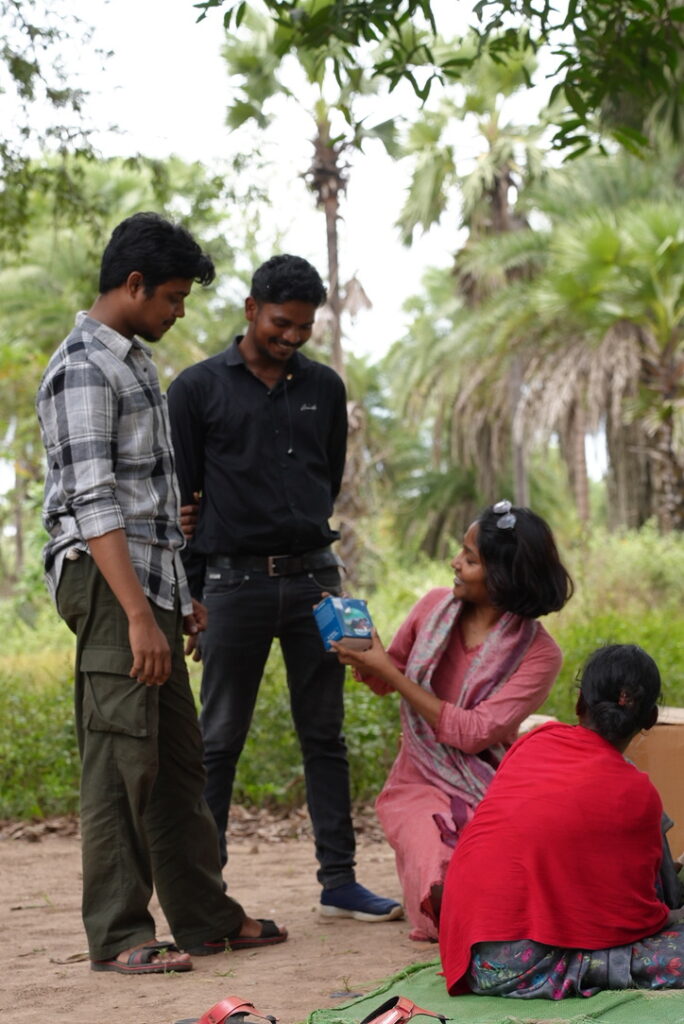
Photo: Sanika, a senior India Fellow and Manager of MHM team of Shiksharth, is talking about menstrual pad to me (left) and Arra (standing next to me), a community educator.
However, one contradiction stood out—while menstruating women were prohibited from doing household chores, they were still allowed to work in the fields. A surprising observation during these days was that, while women were made to live alone outside their homes during menstruation, it was the men who cooked and brought food to them. This was unexpected because, in many parts of India, even in towns, men rarely take on household responsibilities like cooking.
Generalization Is A Problem
Everyday after the event, I discussed the day with the community youth and asked for their opinions. Their responses made me reflect on how limited and incomplete observations can shape perceptions of a region. I had read articles stating that in the tribal villages of Bastar, girls are sent to the forest and forced to spend days and nights in isolation in the forest. But this is not completely true—the real issue is generalization. Many people interact with just one or two communities and assume that the entire Bastar region follows the same practices.
Bastar is far more diverse than it appears from the outside. After spending nearly five months here and engaging in discussions with Community Youth, I have come to understand that language, caste, festivals, marriage customs, and traditions vary significantly from one village to another, sometimes within just a few kilometers. Similarly, menstrual practices are not uniform across all tribal communities. They vary depending on caste, location, and cultural influences within each settlement.
There are multiple castes in this region, such as Gond, Halba, Dhruva, Muria, and Bhatra. The Gond people speak Gondi, the Halba people speak Halbi, the Dhruva people speak Dhurwa, and the Muria people speak Muria, among others. Among the Halba community, there is a tradition of sending girls to the forest during their first menstruation, and celebrate “Tikka” ceremony after four to five days, when menstruation ends. Other castes have different customs.
Read about the Tikka ceremony here, a blog written by Sanika.
My colleague Vijay, who belongs to the Gond caste, said, “Halbi people follow the ritual of sending girls to the forest during their first menstruation. We do not follow that. These rituals depend entirely on caste.”
Dipali and Bhima, both from the Halba caste, explained a common myth about this practice. They said that it is believed girls must spend the night in the forest, but in reality, the ritual is about hiding from men. Families with forests near their homes send girls there, while those with fields nearby send them to the fields. However, in the evening the girls return and spend the night at home.
Photo: Depali and other members of MHM team education girls in communities
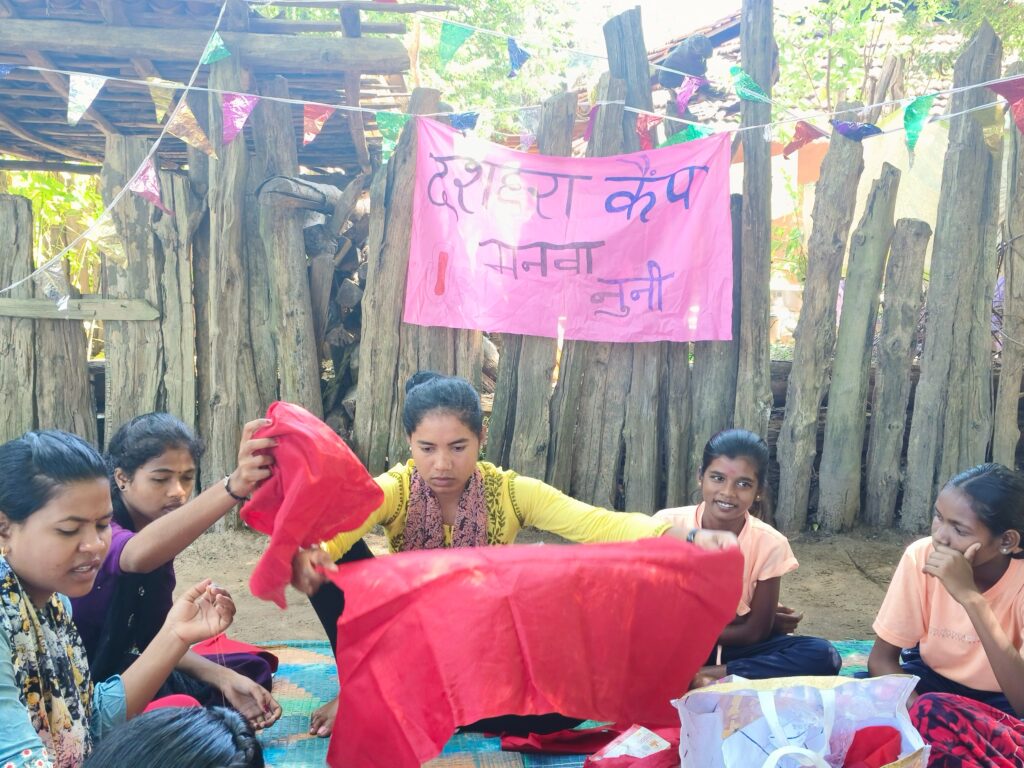
What Next …
But people say that the girls have spent the entire night in the forest which is completely wrong. Maybe some ancestors practiced in the past. But we never see it. When I asked Dipali where she had been sent during her first menstruation, she replied,
“To the forest, because there is a forest beside our house. So it is easy to hide from men going in the forest.” She also added that nowadays, this ritual is gradually declining. “That is why we educate girls at school, because It is difficult to make elderly women understand, but we can help schoolgirls understand. If they are educated, they will not pass these burdensome rules onto future generations.”


In image, (left) “I took this pad for my daughter in law” and (right) Intervention in MP Shree school in Murtonda village.




0 Comments